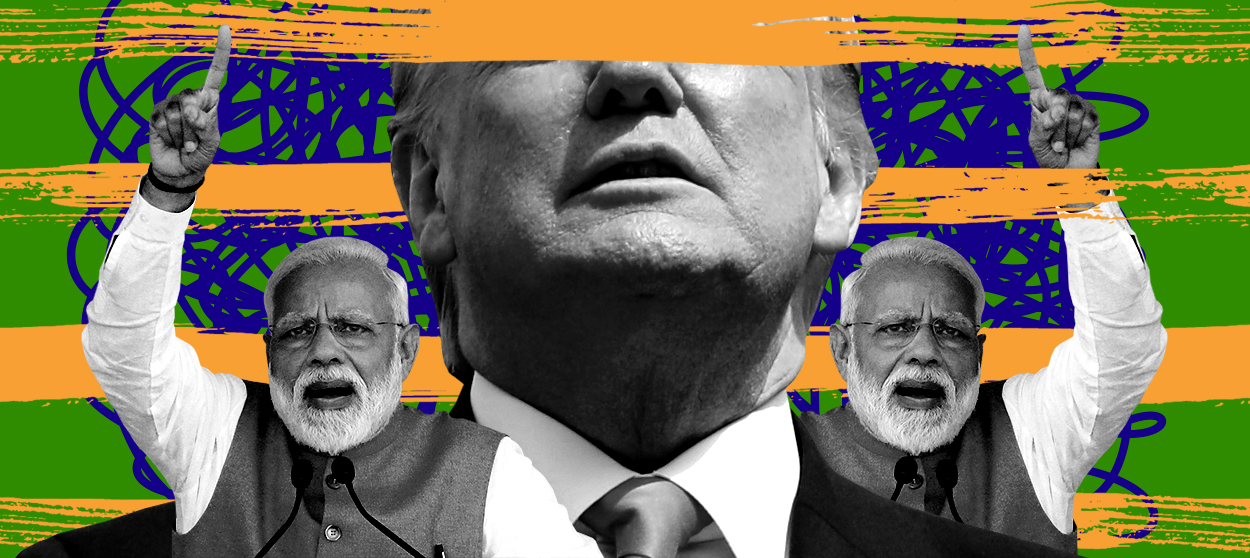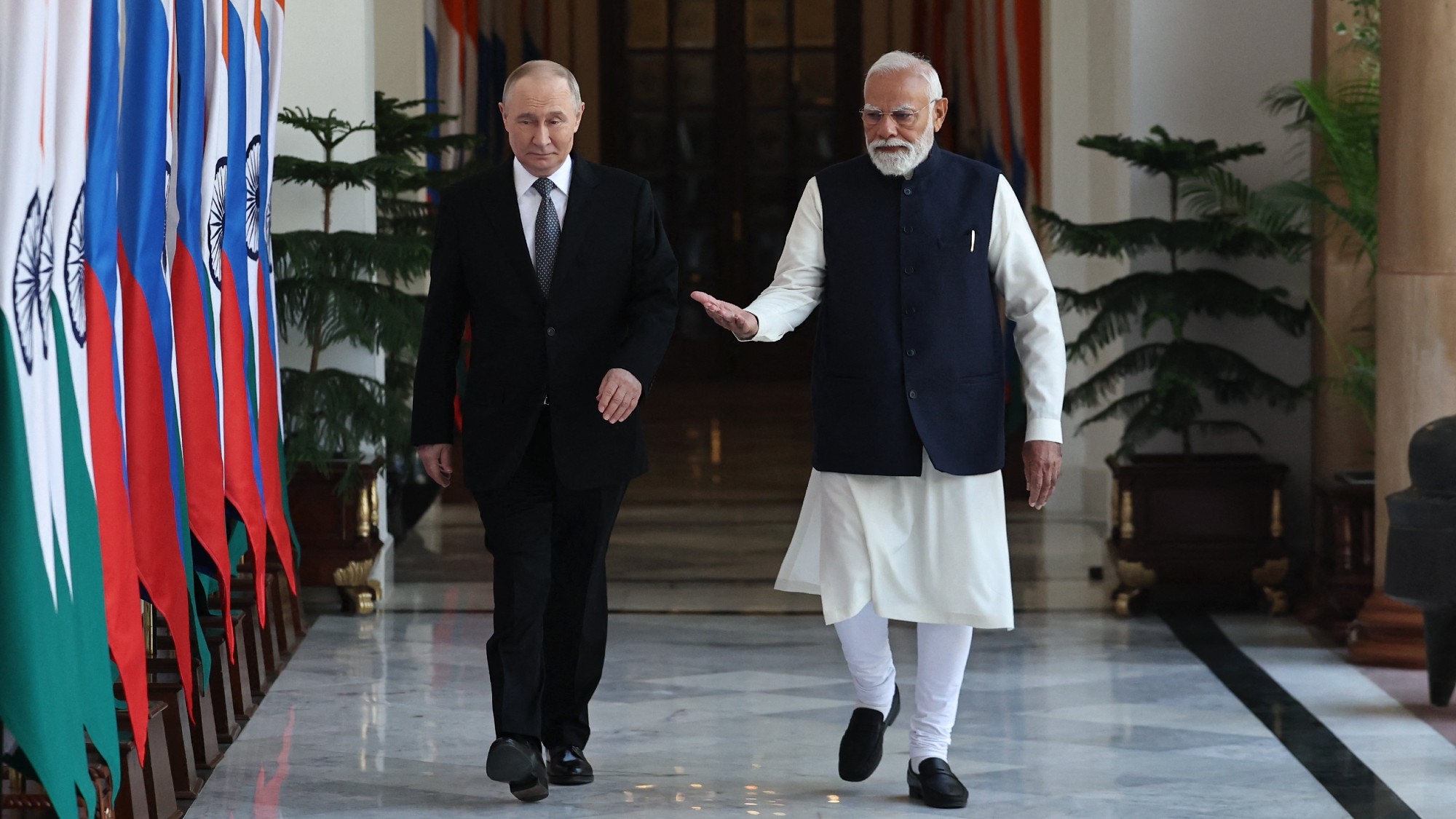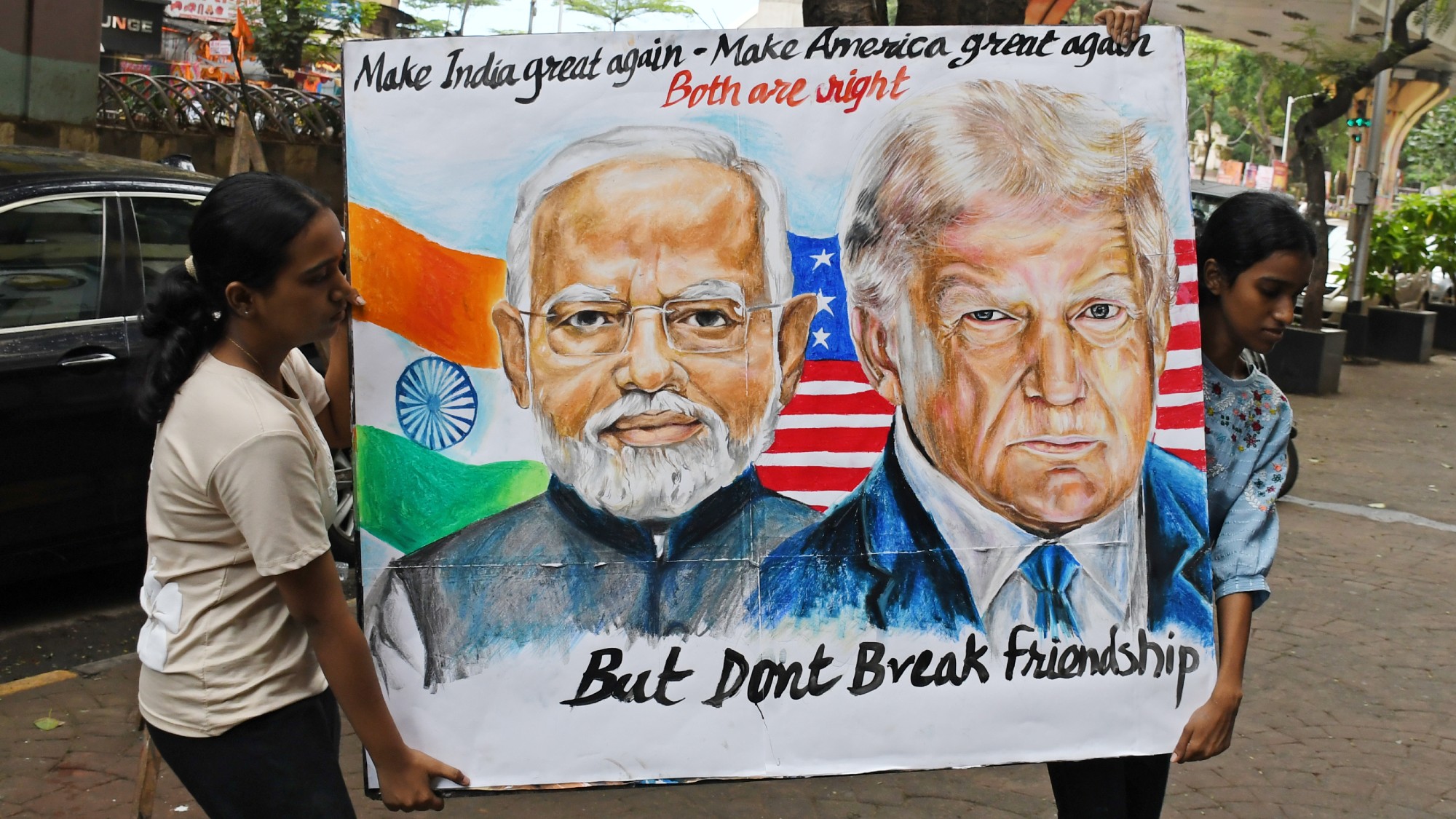Narendra Modi is what Trump would be without constitutional restraints
Imagine a right-wing demagogue who could actually make all his whims come true


A free daily email with the biggest news stories of the day – and the best features from TheWeek.com
You are now subscribed
Your newsletter sign-up was successful
Both my native country, India, and my adopted country, America, are liberal democracies that are right now in the thrall of right-wing populist demagogues — Prime Minister Narendra Modi in India's case and President Donald Trump in America's. Few would deny that between the two, Trump is the crazier one — a showboat with impulse control issues. Modi, by contrast, a humble tea stall owner once, is a veritable picture of discipline and restraint.
Yet Modi, who got re-elected by a landslide last month, is potentially more dangerous because Indian democracy lacks strong institutional checks on his illiberal ambitions. In America, however, multiple resistance points — courts, Congress, opposition both from outside and even within the GOP and states — have managed to thwart Trump's worst instincts.
For all of Trump's bluster and bravado, the fact is that beyond tax cuts, he hasn't accomplished much of his signature agenda. Even though his party controlled all three branches of government for the first two years, Obamacare stands, albeit considerably weakened, and his wall doesn't.
The Week
Escape your echo chamber. Get the facts behind the news, plus analysis from multiple perspectives.

Sign up for The Week's Free Newsletters
From our morning news briefing to a weekly Good News Newsletter, get the best of The Week delivered directly to your inbox.
From our morning news briefing to a weekly Good News Newsletter, get the best of The Week delivered directly to your inbox.
Where Trump has made his real mark is on trade and immigration. By abusing his authority under the National Security Act, he picked unnecessary trade wars. And on immigration, he's used the vast enforcement discretion that Congress has foolishly relinquished to crack down on immigrants far beyond what a majority of Americans support. And he has used administrative means to cut legal immigration even after Congress pointedly refused to do so.
Still, the courts have either watered down (Muslim travel ban) or stalled (scrapping the Obama-era DACA that hands temporary protected status to Dreamers) or outright stopped (defunding sanctuary cities) a good portion of his immigration agenda. Also, although Trump has remade the GOP in his own image with remarkable speed — forcing it to abandon its long-standing commitment to entitlement reform, fiscal responsibility and free trade and embrace profligacy and protectionism instead — there are still limits to how far he can push his party. Indeed, one reason he backed down from his latest threat to impose stiff tariffs on Mexico was to avoid an all-out revolt by incensed Republicans. Moreover, with the House falling into Democratic hands after the 2018 midterms, Trump's grandiose ambitions are pretty much on ice for now.
Contrast this with what Modi got away with in his first term.
One Sunday evening about three years ago, without notice or forewarning, he declared on national TV that close to 90 percent of the nation's currency was null and void effective immediately and would be replaced with new bills. The ostensive purpose of this so-called demonetization was to cure the scourge of "black money" — the illicit cash that rich Indians horde to avoid paying taxes. But the scheme badly backfired as India's wealthy classes managed to use their connections with corrupt bank officials to swap much of their black money while small businessmen and day laborers got wiped out.
A free daily email with the biggest news stories of the day – and the best features from TheWeek.com
In America, Trump could never have pulled off a stunt like this because he simply doesn't have the authority. And if he'd tried, he likely would have been impeached.
But Modi got the Reserve Bank of India (RBI), whose board members serve at the prime minister's pleasure, to rubberstamp his harebrained scheme hours before he announced it. How did he accomplish that?
When the parliament is not in session, Indian ministries (the equivalent of executive agencies) can issue ordinances that they have six months to get ratified by the parliament. Given that the Indian parliament is in session only about 60 days out of the year, this gives ministries lots of time to push all kinds of ordinances. Moreover, when a bill concerns matters of money, which the demonetization one did, they only need to get it ratified in the lower house or Lok Sabha (where Modi enjoyed a big majority when he pushed demonetization and an even bigger one now after the recent elections), and not the upper house (where he didn't).
This meant that once the RBI issued the demonetization order, the only possible pushback in parliament could come from members of Modi's own party, the BJP. But there was no chance of that — not only because the BJP is too cowed by Modi but also because an anti-defection law that India embraced in 1985 gave party bosses, who are in Modi's pocket, untold powers to thwart dissent and crush resistance.
The alleged purpose of the anti-defection bill was to boost government stability. In parliamentary systems, the party that wins the most seats in the lower house gets to pick the prime minister who forms the government. However, if the prime minister enjoys only a narrow majority, a few members can hold the threat of voting with the opposition to make unreasonable demands or, worse, switch sides and bring down the government, a genuine problem in India. The anti-defection law gives the party whip the power to strip the seats of MPs who vote against the party on a bill or motion.
This obviously ruled out even the possibility of a successful no confidence motion — the equivalent of impeachment — against Modi for foisting such a radical scheme on 1.3 billion people. But there was not even the hint of dissent in the BJP, although it can hardly be the case that not a single BJP MP had any qualms given the massive disruptions Modi's brain malarkey caused constituents. In fact, the BJP-controlled Lok Sabha meekly introduced and passed the bill ratifying the scheme in a few hours.
Nor are Indian courts in any position to stop someone like Modi, even if they were so inclined, which they are increasingly not. In the demonetization case their hands were more or less tied because the RBI has sweeping powers to write monetary policy. But even on non-monetary issues, the executive and legislative functions are too conjoined in India for effective judicial oversight. Unlike in England and America where there is a tradition of the parliament writing long and detailed laws precisely to hem in the discretion of the executive, Indian laws tend to be very short and imprecise, laying out some vague policy direction and letting the executive fill in the details as he or she sees fit. This means that there isn't a clear legislative intent that courts can refer to when a prime minister chooses to interpret a law in a self-serving way.
But even if the laws were clearer, the courts would still be reluctant to call out the prime minister or his agencies, notes State University of New York's Shruti Rajagopalan, a constitutional economist and a keen observer of the Indian judiciary. In contrast to America where Supreme Court justices get lifetime appointments, in India they are required to retire by 65, after which they typically seek plum government jobs. Opining against a sitting prime minister isn't a smart career move.
But if governmental checks-and-balances on Modi are weak, external checks are weaker still.
Modi started trashing the Indian media as "paid news" when Trump was still hosting The Apprentice. He accuses the press of a liberal bias and serving the near-dead Congress Party and its politics of minority appeasement — "fake secularism" as he calls it. This has been a remarkably effective narrative that discredits the media, the opposition, liberalism and secularism all at once.
Trump merely fantasizes about starting a government channel to counter "biased" CNN coverage. Modi has been there, done that. For the duration of the elections, the BJP launched — and private cable operators dutifully carried — the NaMo channel whose express purpose was to broadcast pro-Modi propaganda 24/7. This was a clear abuse of power for partisan ends, but India's election commission, fearful of Modi, refused to intervene despite howls of protest from the opposition. Indeed, so insulated is Modi from scrutiny that he maintains his Mr. Squeaky Clean image even though 116 out of the 303 BJP MPs elected this time have pending criminal cases against them, including shockingly a Hindu militant accused of involvement in an anti-Muslim terrorist attack that killed six people.
The only remaining check on Modi is the Rajya Sabha or the upper house where the opposition still has a slight edge. Modi has blamed it of obstructing his agenda, although the truth is that he hasn't even seriously tried to reach out because he lacks both the temperament and the skills to win over detractors and build consensus. However, it is widely expected that he'll conquer this last frontier too next year when many states that have become BJP strongholds in recent years will hold state assembly (legislative) elections. And in India state assemblies are charged with electing Rajya Sabha members.
The great hope of Modi is that he'll use his awesome powers to finally deliver much needed but difficult pro-growth reforms that he promised when he was first elected. That is not outside the realm of possibility, but demonetization shows that Modi is also capable of great harm. If he chooses to advance his long-standing Hindu nationalist agenda, he has the power to do it.
It's already a foregone conclusion that he'll use his second term to push divisive issues such as weakening constitutional accommodations for the practices of religious minorities. The big question is whether he'll also push issues like constructing a temple on the site of a historic mosque that Hindu militants razed in 1992. The fact that he has done nothing to control the epidemic of lynchings by Hindu nationalists of Muslims suspected of consuming beef does not bode well. He talked about winning the trust of India's religious minorities during his inauguration speech. But rather than outlining steps to beef up — so to speak — their security, he redoubled his accusation against the "fake secularism" of the bloodied and maimed opposition. The BJP head, Amit Shah, also an avowed Hindu nationalist who is Modi's trusted lieutenant, had already included such controversial "reforms" in the BJP's election manifesto. And, ominously, Modi just made Shah his Home Minister — the equivalent of Department of Homeland Security Secretary — the second most powerful position after his own.
Modi is a loaded gun. It is possible that he won't go off. But there is no institution left in India to disarm him for the next five years. India's opposition is decimated, internal party resistance neutralized, the legislative branch neutered, the courts compliant and the media vanquished.
Trump is manifestly unfit for office. The capacity of America's institutions to resist and stop him is not inexhaustible — and the longer he stays, the weaker they'll get given that he is on a constant collision course with them. For now, however, Americans should be grateful that they are not at the mercy of one man.
Shikha Dalmia is a visiting fellow at the Mercatus Center at George Mason University studying the rise of populist authoritarianism. She is a Bloomberg View contributor and a columnist at the Washington Examiner, and she also writes regularly for The New York Times, USA Today, The Wall Street Journal, and numerous other publications. She considers herself to be a progressive libertarian and an agnostic with Buddhist longings and a Sufi soul.
-
 Local elections 2026: where are they and who is expected to win?
Local elections 2026: where are they and who is expected to win?The Explainer Labour is braced for heavy losses and U-turn on postponing some council elections hasn’t helped the party’s prospects
-
 6 of the world’s most accessible destinations
6 of the world’s most accessible destinationsThe Week Recommends Experience all of Berlin, Singapore and Sydney
-
 How the FCC’s ‘equal time’ rule works
How the FCC’s ‘equal time’ rule worksIn the Spotlight The law is at the heart of the Colbert-CBS conflict
-
 The billionaires’ wealth tax: a catastrophe for California?
The billionaires’ wealth tax: a catastrophe for California?Talking Point Peter Thiel and Larry Page preparing to change state residency
-
 Biggest political break-ups and make-ups of 2025
Biggest political break-ups and make-ups of 2025The Explainer From Trump and Musk to the UK and the EU, Christmas wouldn’t be Christmas without a round-up of the year’s relationship drama
-
 Bari Weiss’ ‘60 Minutes’ scandal is about more than one report
Bari Weiss’ ‘60 Minutes’ scandal is about more than one reportIN THE SPOTLIGHT By blocking an approved segment on a controversial prison holding US deportees in El Salvador, the editor-in-chief of CBS News has become the main story
-
 Is a Putin-Modi love-in a worry for the West?
Is a Putin-Modi love-in a worry for the West?Today’s Big Question The Indian leader is walking a ‘tightrope’ between Russia and the United States
-
 Has Zohran Mamdani shown the Democrats how to win again?
Has Zohran Mamdani shown the Democrats how to win again?Today’s Big Question New York City mayoral election touted as victory for left-wing populists but moderate centrist wins elsewhere present more complex path for Democratic Party
-
 Millions turn out for anti-Trump ‘No Kings’ rallies
Millions turn out for anti-Trump ‘No Kings’ ralliesSpeed Read An estimated 7 million people participated, 2 million more than at the first ‘No Kings’ protest in June
-
 Trump and Modi: the end of a beautiful friendship?
Trump and Modi: the end of a beautiful friendship?In the Spotlight Harsh US tariffs designed to wrest concessions from Delhi have been condemned as 'a new form of imperialism'
-
 Ghislaine Maxwell: angling for a Trump pardon
Ghislaine Maxwell: angling for a Trump pardonTalking Point Convicted sex trafficker's testimony could shed new light on president's links to Jeffrey Epstein
